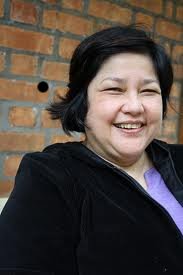 |
| Sylvia Claudio |
Continuing the theme of macho control-freakery in the patriarchal religions, here's an interesting article on 'decentering' by Filipina Buddhist psychologist Sylvia Estrada Claudio.
Pacquiao, Corona, Lady Gaga, the CBCP and me
By Sylvia Estrada Claudio - director of the University of the Philippines Center for Women's Studies.
From Rappler
'My psychological training and readings in Buddhism, have taught me the value of “decentering.” Decentering builds empathy and compassion. Decentering is what happens when a person “walks a mile in another's shoes.” It is a necessary skill for the psychologist, who must come to an adequate understanding of the person seeking advice. It means being able to take oneself out of the “center” of one's world.
Decentering can be a form of spiritual practice apart from a psychological skill. It is one way to love one's enemy. It is necessary to decenter when one disagrees with another person. The more fundamental the disagreement, the more difficult it is to decenter. And yet it is more important as the differences increase.
Psychological studies show that homophobia is lessened when the bigoted person gets to interact with an increasing number of lesbian, gay, bisexual and transgender persons. Many programs for peace-building recognize exposure and exchange between groups as one mechanism for conflict resolution.
Lessening the emphasis on the self leads to other spiritual gains. Immersion in a field, a forest, a mountain or an ocean evokes in me an understanding of being a miniscule part of a larger whole to which I owe respect and reverence.
Because religious conservatives and groups like the CBCP (Catholic Bishops' Conference of the Philippines) rile me so deeply and so often, it is they that provide me the most opportunities for decentering. I try very hard to understand the lived realities of Bishops.
I am glad I have Catholic friends. It is to them I address questions like, “how can they rail again sexual sin and then be so lax when they deal with the sexual abuse of priests?” Or, “how can he stand there and lecture to the Filipino people about the immorality of the reproductive health bill, when I know he is a sexual harasser?”
My friends explain to me that it is the role of the priest is to tell us what is right and wrong. That his years of study and prayer make him the expert on this matter. That the organization and laws of the Church give him this authority. In this sense, it has nothing to do with moral character of the priest.
I appreciate such answers. My friends may not accept the reasoning, but they know that some of my questions only seem rhetorical.
Such answers help me create a psychological profile of the CBCP and its conservative followers. (Not all Catholics are conservatives. Many see the same liberal Jesus that I see when I read the New Testament.) Psychologists distinguish between authoritarian and patriarchal leadership/parenting styles and democratic ones. In authoritarian families, the power to decide what is good for the family is held by the father (or in patriarchal systems, the father priest, Father of the Nation, God the Father). It is the psychological basis for cults and social movements based on the authority of its founder/s and its hierarchy.
I agree, however, with the opinion of many child development experts that more democratic methods be used in raising children. Decision-making should be shared between husband and wife and becomes increasingly consultative as the children mature. Such families teach children to think and feel for themselves. The capacity for taking responsibility for and control of one's life is also called “agency.” Agency is central to other aspects of success —family survival, academic excellence, self-efficacy, satisfaction and happiness. It is the educational foundation for citizens who must deal with the give-and-take of democratic political systems. It leads to a life-long comfort with change and the capacity to adapt.
In any case, we see how the CBCP could never be guilty of blasphemy because as the Fathers of the Church, they determine what is good and what is evil. This brings me to the issue of Lady Gaga, and her blasphemy... Full Article
Related Articles
Buddhist Mindfulness Meditation Alleviates Depression
Bodhisattva vows - an antidote to depression and mental illness
Honoring the Feminine in Buddhism
Control-freak patriarchal religions that bully, humiliate and mutilate girls
Buddhist pedophile ring gang-rapes British girls
Buddhist Candlemas and Celtic Celebration of Brigid
Why is God Male?
---
---
No comments:
Post a Comment